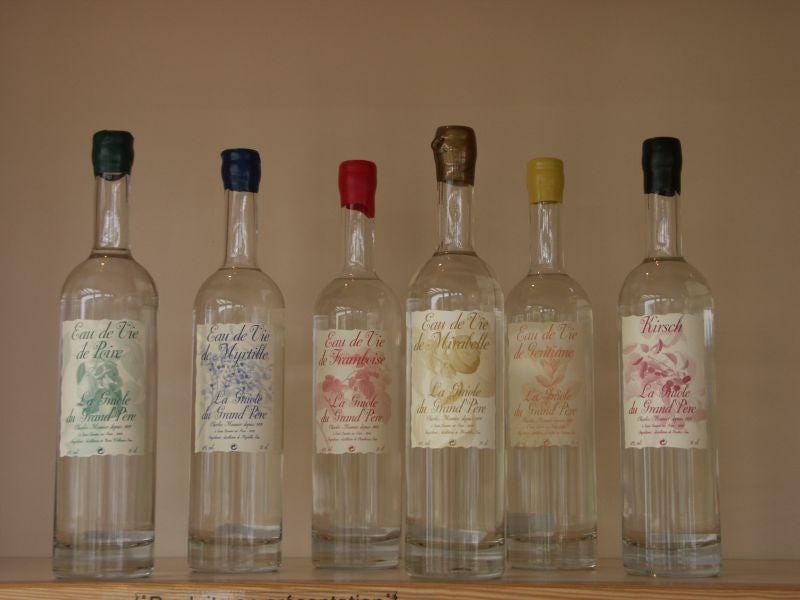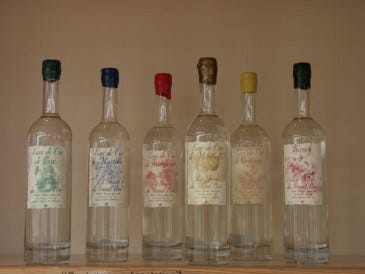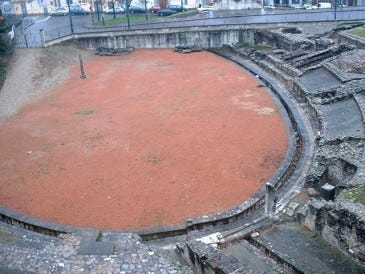Eau de Vie – The Last Wisdom – A Poem by Luke Welch

by Luke A Welch
dédier à Francis Foucachon

This is a long poem. To read’s a decision
To find how the French have searched every last wisdom
of when to place white, and the rose, and the red,
and then when comes the cognac in meal that you’re fed?
And what of those drinks without place at the table?
They have their own place in this poetry fable.
With them we begin with their red, sweetness shown
And a trip to drink tea, miles far from Lyon.
—
We left the Lassaigne house, Roanne to see.
My friend met a friend so we stopped in for tea.
O each trip has a time for a mild tisane,
and the hard liquor poured in that house in Roanne.
Once went to a wedding for friends in the Lord,
the first time I had had the iced drink that they poured:
O don’t be surprised, for in France, here’s the truth
ask for a Martini, get sweet, red vermouth.
On a hot Lyon afternoon, mussels and fries
are paired up with a koolaid-red beer and comprise
the single course poem I eat ‘neath the walls
just outside of the theater of the Three Gauls.
But a tea, or a beer, or vermouthy surprise
Though the Kriek beer and Rossi both red to the eyes
Do not compete equally with the red wine,
that is needed most properly, fully to dine
For the toll of the beat of a seven course meal
is rung by each drink that sets tone with its peal
and where beer has no place within Frankish parameter
ringing much stronger than Lambic pentameter
You’ll follow the course through the courses with drink
And you’ll sit and you’ll talk and you’ll linger and think
And your meal is a poem, each word from a friend
Helps to rhyme and keep rhythm until the meal’s end
You started with kir, and are red wine elated
and after your fondant, you’ve been caffeinated
there’s only one thing that can finish the sup
and it’s strong and distilled and it cleans out your cup
Now I learned this the first soirée I came to stay
with a friend at the home of an hostelier
Where after the dinner of pasta and cheese,
He later served salad, but pardon him please
For every French meal, it supposes an order
With reasons for seasons, and crossing each border
It’s done with direction, discretion and plan
As I learned from my host in that home in Roanne
I knew that the French have sought every last wisdom:
what must be ensemble and what must have schism,
what drink to put when and just what is it’s purpose –
So let me now tell you about such a service.
Such will come in handy; you won’t be naïf
when you’re served that imperative apéritif.
A white wine with syrup and peanuts for treat
(for salt makes one hungry and ready to eat).
O now we think a menu gives choice page by page,
But in France, it’s one list with a choice for each stage,
And despite what you learn in American source,
An entree’s an entry, and not the main course
The entree is first and it has to be light
A salad with foie gras demanding a white
But not with the syrup of previous kir,
(and we’ve started a meal, so do not ask for beer!)
For each drink has its place and each place has a reason
The chef is an artist, do not speak the treason
Of asking for coffee or beer with your salad
Those two drinks destroy your now sensitive palate
The red is a knife for your two inch thick steak
(don’t worry there’s water your true thirst to slake)
The fat and the red drip, but goodness has clung
and requires the wine to cut fat from your tongue
Should you taste again beef, you will need that red wine,
But the wine makes you new, so continue to dine!
O, to pull them apart is a functional sin,
But you have them together, so taste them again!
There’s time to keep poem-ing into the night
You’ve reserved now the table, so no need for flight
The chef is the waiter, the cook, the cashier,
but he will not badger, stay hours without fear!
He will, though, keep eye on the wine in carafe
And how fast it falls. Do you sip, or you quaff?
He won’t let you run out, for drink turns each bend,
While you sit and you poem your night with your friend.
The plates are now moving, you look at that friend
But he says, “Keep your wine, for it isn’t the end.”
And you’ve eaten light, slowly, it’s not a barrage,
and you’ve plenty of room left for hunks of fromage.
The cheese will now run or be sharp on your tongue,
and there’s goat and there’s blue, and wood knife there among
all the bries, (how much cheese!?) Just how many, you wondered…
In France, they parade out the number four-hundred.
So just get enough you can finish that red,
as you’re climbing downhill and you’ve still to be fed.
“The dessert cometh next,” the fine chef finally says,
“It’s a melting of chocolate dripped with crème anglaise”
No way to describe it; it’s better than fudge,
but it’s cold and it’s soft, and its shape will not budge,
And the crème with vanilla is perfectly plated.
The sweet thing is given to make sure you’re sated.
There’s salt to make hungry and sugar to stop.
You’re pouring more water, now into your cup,
For it’s time to move on, you have eaten en masse
It is time for express cafe in demi-tasse.
And the coffee will cut you from meal like a knife,
And you’re glad that you swam deep in waters of life,
Should you rue that to eat eats of time such a hunk?
Were the meal not so long, well then, friend, you’d be drunk!
So beside is the sugar in cylinder pack,
for the white, tiny cups that now brim swimming black,
and the foaming mousse blackness is up to their necks.
(Oh, “Expresso” in French, really does have an “x.”)
On to “y” and to “zede,” and you’re happily fed
“O, let’s go catch our metro… the line that is red,”
you now say to your friend as you start to get up,
But he laughs, “We’ll need something to clean out our cup!”
And you’ve had a kir, and are red wine elated
and after your fondant, you’ve been caffeinated,
there’s only one thing that can finish the sup,
and it’s strong and distilled and it cleans out your cup,
And it seems like an afterthought, last to be tried,
but still there is a wisdom, and you will abide.
The eau de vie totally wipes clean the stain
so pleasantly wiping your throat now with pain.
“Eau de vie” means a cognac, else whiskey will do,
And they both have a name that rings something else true:
They both clean out the cup, they both cut like a knife,
and both liter-ally mean “The Water of Life.”
O, thou water of life, you have waited so long
to make clearest appearance within your own song
and to tear your way downward and clean up inside
You’re the first to be made, but the last to be tried.
Now, it’s funny how people who wisely have chosen
each course and resource have been longly so frozen
They searched all the fruit of the tree of decision,
But left tree of life as the very last wisdom
With Solomon’s ev’rything under the sun,
They found many riches, but wisdom in none.
For they missed the revival of hot, thick perfection
Why wake up with coffee, without resurrection?
They know there’s an order, designs given breath
But reject the designer, distiller and chef!
O, the water of life will clean deep down inside
It’s the first that’s fermented, and last to be tried.
O, the French may wait hours to join in this song
But the Chef, He is patient with clues all along,
There are clues in the salt, and the sweetness they’re fed
But so many, so many clues poured out and red.
And that red, sometimes dry, cutting knife of the truth
Cometh often, so often, like sweet, red vermouth.
But in these surrounding hills, sous-chefs were bled
as the Lord set the table and drank of their red.
Like dear Blandine of Lyons who gave up her life;
She withstood bull, and lions, and died by the knife.
And her blood ran like cherry-beer drunk ‘neath the walls,
that sit under her martyrdom there at Three Gauls.
And it stands as a threat and a promise of love,
it’s a wine well-designed by it’s vintner above
And it’s Jesus’ blood on display: sweet, red and hot
It’s the only one drink that can clean out the spot.
And so here’s the conclusion, like Solomon’s claim:
there is only one drink that can wash out your stain.
And it’s lovingly pressed and now waits by your hand.
And it isn’t the wisdom first chosen by man.
And it cuts like a liquor, but it’s mild like tisane.
As I learned that first night in that house in Roanne.

—–
Luke Welch has a master’s degree from Covenant Seminary and preaches regularly in a conservative Anglican church in Maryland. For three years, Luke lived in Lyon, France. He blogs about Bible structure at SUBTEXT. Follow him on Twitter: @lukeawelch<>microhack.orgраскрутка магазина одежды
The post Eau de Vie – The Last Wisdom – A Poem by Luke Welch appeared first on Kuyperian Commentary.

